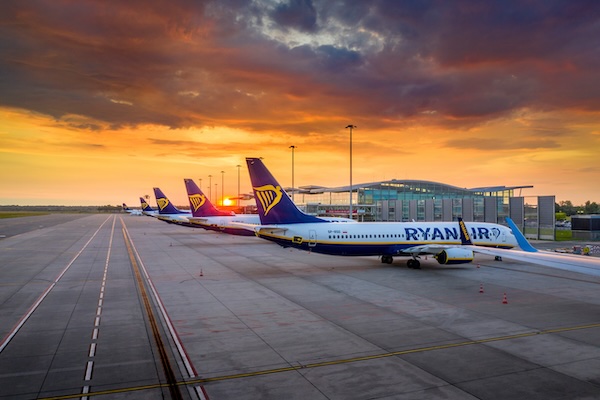Ryanair reports a 46% decline in profits attributed to disruptions and fare reductions.
A surge in passenger numbers was insufficient to counterbalance timing issues and reduced fares.
Ryanair experienced a notable decline in its profits for the second quarter, with figures dropping by 46% to €360 million. This downturn is attributed to operational disruptions, including a 10-day period marked by extensive flight delays and cancellations. Additionally, while passenger numbers increased by 20% year-on-year, the timing of Easter negatively impacted the fiscal results as it was accounted for in the previous quarter, combined with weaker than anticipated airfares.
The average fare for Ryanair’s peak summer season has dropped significantly by 15%, declining from €49.07 to €41.93 compared to the previous year. This reduction is expected to persist throughout the peak summer months, contributing to market competitiveness. As Michael O’Leary, the Group Chief Executive, noted, peak summer demand was robust but price dynamics softened more than anticipated. He emphasised the necessity for the European Commission to reform air traffic control services to enhance efficiency.
Ryanair’s operations faced substantial challenges due to the delayed delivery of new Boeing aircraft, which resulted in 20 fewer new B737s than planned. This setback forced the airline to extend lease agreements for three Airbus A320s for its Lauda division in Austria to manage an expansive summer schedule comprising over 200 new routes.
O’Leary outlined strategic measures to address these operational hurdles by continuing the acquisition of B737s over August and September, even though these aircraft would be unavailable for peak summer deployments. Furthermore, he forecasted that the short-haul European capacity would remain constrained for several years. This is due to ongoing issues such as Airbus aircraft engine recalls, backlog in deliveries, and the consolidation within European airlines, which will require adaptive strategies by the airline to maintain service levels.
Despite facing immediate operational barriers, Ryanair aims to increase its annual traffic by 8% to reach a projected 200 million passengers, contingent on the timely resolution of Boeing delivery challenges. Ryanair’s strategy underscores its commitment to growth, with expectations of overcoming current setbacks through concerted efforts in fleet management and operational planning.
The situation at Ryanair is indicative of wider industry trends, where airlines must navigate complex logistical challenges, reform concessions, and market fluctuations. Ryanair’s call for improved air traffic control efficiency highlights systemic issues within the EU’s aviation policy framework, which could influence future regulatory reforms aimed at stabilising air travel operations across Europe.
Ryanair’s experience during this period reflects broader complexities facing the aviation industry. The airline’s strategic adaptations and calls for regulatory improvements signify critical elements for sustaining growth and operational resilience in a competitive market.
The current challenges Ryanair confronts are emblematic of industry-wide hurdles.
Strategic planning and regulatory reforms are essential to navigate future obstacles.

